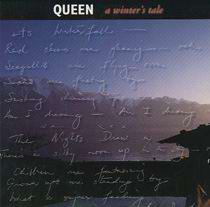This article needs additional citations for verification .(October 2020) |
| "A Winter's Tale" | ||||
|---|---|---|---|---|
 Artwork for UK release | ||||
| Single by Queen | ||||
| from the album Made in Heaven | ||||
| B-side |
| |||
| Released | 11 December 1995 [2] | |||
| Length | 3:49 | |||
| Label |
| |||
| Songwriter(s) | Queen (Freddie Mercury) | |||
| Producer(s) |
| |||
| Queen singles chronology | ||||
| ||||
| Music video | ||||
| "A Winter's Tale" on YouTube | ||||
"A Winter's Tale" is a song by Queen, from the album Made in Heaven , released in 1995 after Freddie Mercury's death in 1991. It was written after the Innuendo sessions, inspired as Mercury was staring out the windows of various places in Montreux. The song has a psychedelic, dreamy feel, and describes what Mercury saw outside the windows.